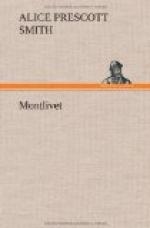I turned to the chief, and would have translated what had been said, but after the first phrase, he motioned me to silence. “She has taken my robe. She has become of my family. That is sufficient.” He lifted his calumet, and went to give orders for the feasting.
So the priest and I stood alone. He looked at me, and shook his head. His mouth was smiling, but I saw him brush at his eyes. “You have married a woman of great spirit, monsieur,” he said, with a touch of his hand on my sleeve. “They are rare,—most rare.” He stopped. “Yet the roedeer is not made for the paddock,” he said impersonally.
I laughed, and it sounded exultant. I felt the blood hammer in my temples. “Nor can the thrush be tamed to sit the finger like the parrakeet,” I completed. “I understand that, Father Nouvel.”
The wedding feast followed. Madame de Montlivet, the priest, Onanguisse, and I sat in a semicircle on the ground, and slaves served us with wooden trenchers of food. We each had our separate service, like monks in a refectory, but we were not treated with equal state, for the woman drank from a copper-trimmed ladle, made from the polished skull of a buffalo, while my cup was a dried gourd. We ate in ceremonial silence, and were sunk in our own thoughts. There was food till the stomach sickened at its gross abundance: whitefish, broth, sagamite, the feet of a bear, the roasted tail of a beaver. I watched the slaves bring the food and bear it away, and I said to myself that I was sitting at my wedding feast,—a feast to celebrate a false marriage.
After the feast, the calumet was danced before us. Still there was silence between the woman and myself as we sat side by side. I wondered if she realized that this strange dance was still further confirmation of what we had done; that it was part of the ceremony of our marriage. It was a picture as unreal, as incomprehensible, as the fate we had invited. The sun was westering, and shone full upon the dancing braves. Their corded muscles and protruding eyes made them ghastly as tortured wretches of some red-lit inferno. There was no laughter nor jesting. The kettle-drum rumbled like water in a cave, and the chant of the singers wailed, and died, and wailed again. And this was for my wedding. I looked down at the woman’s hand that bore my




